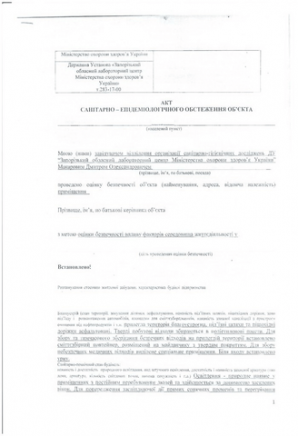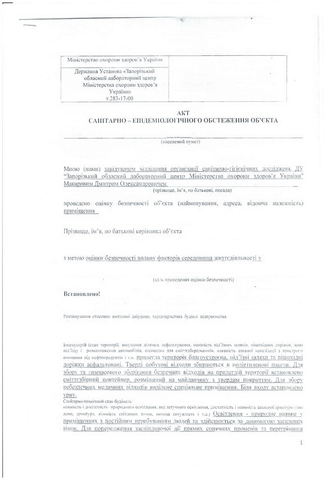Sanitary control and fire supervision in the restaurant
Cost of services:
Reviews of our Clients
... our work on joint projects assured us of your high level of professionalism
Compliance with fire safety and sanitary regulations is extremely important for owners of restaurant businesses and other public establishments, because preservation of property and human health is a key component of the activities of both owners and officials and their employees.
In addition, the law regulates the criteria for assessing the degree of risk of the enterprise in order to determine the frequency of appropriate inspections for compliance with fire safety.
In particular, according to these criteria, restaurant activity is evaluated as an activity with a high degree of risk and with the most frequent scheduled inspections.
This means that even at the start of your restaurant business you should make sure that the initial inspections by the sanitary and fire control authorities go smoothly, and your establishment will receive a positive assessment.
You may also like: Restaurant Accounting
What do fire control authorities check during scheduled and unscheduled inspections?
State control authorities check the use of products of proper quality by the establishment, not violating the acceptable level of danger to visitors, staff and other citizens, as well as the environment.
First of all, inspectors check the presence of and compliance with fire safety regulations in the establishment and all mandatory instructions, which specify the order of this regime and the actions of employees, in particular:
- proper maintenance of evacuation routes;
- compliance with the rules for the use of household heating devices;
- certain places of storage of fresh and finished products, as well as semi-finished products, in the premises and on the territory of the establishment;
- procedures for employees’ actions in case of fire, namely: notification of visitors and staff by employees, calling the fire and rescue service, procedures for stopping equipment, turning off elevators, use of fire extinguishing means;
- the rules of the stage-by-stage evacuation of people and material assets in compliance with safety regulations;
- and other mandatory protective measures.
In addition, the institutions must conduct fire drills for staff and study the Fire Fighting Techniques.
Public establishments must have evacuation plans (diagrams) in case of fire, in all visible places in the room.
The manager must approve the instruction, according to the schematic evacuation plan, with sequential actions of the staff of the institution to ensure the safe and quick evacuation of people in emergencies. For this purpose, the establishment must conduct practical training of all employees at least once every six months, both during the day and at night.
During inspections, state inspectors also check the condition of the premises for compliance with fire safety requirements, such as:
- Are the premises and other facilities on the territory of the institution equipped with fire protection systems?
Note: The type of fire extinguishing systems - automatic or autonomous, or primary fire extinguishing means, also play an important role. It’s also worth noting that these systems must be installed in accordance with current fire safety standards, and the location of fire extinguishing equipment must be marked on the premises with appropriate signs.
- Is the fire sprinkler system installed in the premises of the institution?
There are certain technical requirements for the premises, in particular:
- The main aisle in the dining room of the restaurant shall be at least 1.35 m wide, lead to the evacuation exits and in addition, it must be kept clear at all times;
- Evacuation routes (corridors, staircases, other) which do not have windows and no sunlight shall be illuminated by electric light at all times;
- The door on the evacuation route must open only in the direction of exit from the premises, etc.
You may also like: Advertising or Signage: How Not to Get Penalized?
What do sanitary control authorities check during scheduled and unscheduled inspections?
With regard to sanitary control, catering establishments are checked in particular for:
- The presence of special technological documentation for dishes, which should contain a description of the cooking process, as well as shelf life of products, storage conditions and certain quality requirements for dishes;
- Compliance of restaurant employees with the technology of food preparation (rules of food compatibility, cooking mode of products, etc.), established by certain regulatory documentation;
- Compliance with the hygiene standards for personnel working directly with food. As well as hygiene standards for the premises, in particular: keeping the premises clean and in good condition; ensuring that the premises and products are protected from the risk of contamination or infestation, in particular from pests, rodents, etc.
In addition, the sanitary control authorities verify the implementation of the HACCP (Hazard Analysis and Critical Control Point) system, which is necessary for the restaurant business. You can read more about the HACCP system in our article or consult our lawyer.
What kinds of inspections and what are the grounds for them?
The controlling authorities may conduct scheduled and unscheduled inspections.
Information about scheduled inspections of businesses by supervisory authorities is published on the official website of these authorities.
The list of entities, whose activities are subject to scheduled inspections, as well as the frequency of these inspections are determined by state controlling authorities, depending on the degree of risk of economic activities. For example, the activities of restaurants are classified as high risk and are subject to scheduled inspections every two years. Also, the list of issues subject to scheduled inspections is determined depending on the degree of risk.
Please note! The controlling authorities must carry out scheduled inspections only after written notification of the enterprise, within a period not exceeding 10 days before the start of the inspection. In its turn the owner of an establishment has the right to deny an inspector access to an inspection if the enterprise has not received such notification in time.
Grounds for unscheduled inspections include:
- Control on the part of state authorities over the execution of orders and prescriptions, as well as other documents of an instructional nature, drawn up by controlling authorities based on the results of a preliminary inspection to eliminate violations;
- Reports by citizens to such a state authority about violations that occurred in the establishment and caused harm to life or health, or violated the rights of such a person.
Please note! When conducting an unscheduled inspection, the inspector has the right to check only those violations that were the basis for such an inspection.
Scheduled or unscheduled inspections of the establishment must be carried out only in the presence of the head of the establishment or a person authorized by him.
In addition, prior to the start of any inspection, an inspector of the controlling authority must show the head or other authorized person a certificate (referral) to conduct such an inspection. This certificate (referral) must be duly executed, otherwise the owner of the institution has the right to reject the inspection of such persons.
If you know about the inspection in advance – contact us, we will help you pass it successfully.
What about the loud operation of air conditioning and other technical systems in institutions?
There are sanitary norms of permissible noise level in the enterprise established by legislation, for violation of which the Department of the State Service of Ukraine on Food Safety and Consumer Protection can bring to justice owners of institutions – to oblige the owner to eliminate the detected violations and pay a fine from UAH 255 to UAH 510.
Controlling authorities make instrumental measurements of noise levels: the work of ventilation systems, air conditioners and exhaust systems during the day and night.
The permissible noise level of machinery during the daytime must not exceed 50 dBA, and at night it must be no more than 40 dBA.
Sanitary regulations establish maximum allowable sound levels for restaurant, cafe and bar halls, which are:
- during the performance of musical ensembles - 85 dBA;
- when playing music by electroacoustic systems - 70 dBA;
- on open-air dance floors not more than 90 dBA within 2 meters from the sound source.
You may also like: How to Legally Play Music Tracks in a Restaurant?
Liability of owners of establishments for violation of fire and sanitary safety requirements
Violation of fire safety requirements, which endangers the health and life of people, as well as failure to comply with the orders and instructions of controlling authorities, entails the application of certain penalties against the owners of the institution:
- complete or partial shutdown of the institution, individual industries and premises;
- disconnection of power sources in the premises of the institution and the sealing of electrical switchboards.
Which completely stops the operation of the enterprise for an indefinite period of time.
When violations of hygienic (sanitary) requirements are identified during the activities of the establishment, in particular in cases of poisoning, the presence of mass diseases (infectious and/or non-infectious), the control authorities may:
- temporarily terminate (limit or prohibit) the activities of establishments;
- draw up protocols on administrative offenses, consider cases of offenses and impose fines on officials of the establishment;
- transfer to law enforcement bodies the acts of inspections of the establishment and other materials, if this is within their competence.
To apply penalties to the owner of the establishment and officials, in particular in the form of stopping the operation of the establishment and/or other premises, officials of the relevant controlling authority file a lawsuit to an administrative court for a court order.
An analysis of court practice on these issues shows that the neglect of established safety rules by the owners of the establishment and their officials leads to the restriction of such activities by the court. Most often in the form of penalties such as the complete suspension of the operation of the building of an establishment (restaurant).
What should entrepreneurs do so that their activities are not restricted or stopped completely?
- Comply with the legislative requirements in the field of fire and sanitary safety;
- At the beginning of work, take care of a tested, reliable system of compliance with sanitary and fire control requirements;
- Prepare carefully for scheduled inspections of the establishment by the controlling authorities;
- Follow the orders and instructions, as well as other administrative documents of the controlling authorities;
- Eliminate in a timely manner any violations of the law by the enterprise;
- Know their rights as business entities and the obligations of the officials of the controlling authorities during inspections;
- Turn to lawyers for professional advice in due time.
How can our lawyers help?
- Analyze the material and technical base of the establishment for compliance with legal requirements;
- Assist in preparing the premises for a scheduled inspection;
- Provide qualification assistance in the case of drawing up instructions and other orders by the controlling authorities regarding violations of the law;
- Provide legal support in pre-trial settlement of a dispute with the controlling authorities;
- Provide legal support in the consideration of an administrative case in court within the framework agreed with you.
Do you start a restaurant and want to be sure that you have no problems with the fire and sanitary authorities? Don’t hesitate to contact us!
Didn’t find an answer to your question?
Everything about starting a restaurant business in Ukraine here.
Our clients






